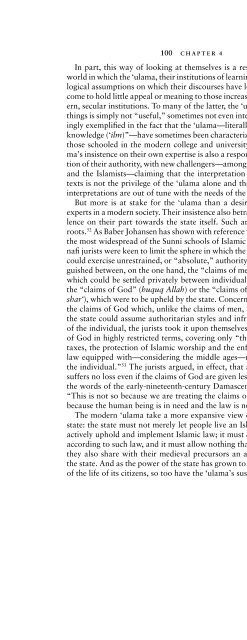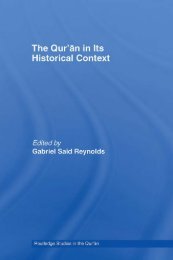Download (1 MB) - Islam and Christian-Muslim Relations: Articles ...
Download (1 MB) - Islam and Christian-Muslim Relations: Articles ...
Download (1 MB) - Islam and Christian-Muslim Relations: Articles ...
You also want an ePaper? Increase the reach of your titles
YUMPU automatically turns print PDFs into web optimized ePapers that Google loves.
100 CHAPTER 4In part, this way of looking at themselves is a response to a changedworld in which the ‘ulama, their institutions of learning, <strong>and</strong> the epistemologicalassumptions on which their discourses have long been based havecome to hold little appeal or meaning to those increasingly drawn to modern,secular institutions. To many of the latter, the ‘ulama’s way of doingthings is simply not “useful,” sometimes not even intelligible. This is strikinglyexemplified in the fact that the ‘ulama—literally, the “possessors ofknowledge (‘ilm)”—have sometimes been characterized as uneducated bythose schooled in the modern college <strong>and</strong> university system. 50 The ‘ulama’sinsistence on their own expertise is also a response to the fragmentationof their authority, with new challengers—among them the modernists<strong>and</strong> the <strong>Islam</strong>ists—claiming that the interpretation of the foundationaltexts is not the privilege of the ‘ulama alone <strong>and</strong> that, in any case, theirinterpretations are out of tune with the needs of the modern world. 51But more is at stake for the ‘ulama than a desire for recognition asexperts in a modern society. Their insistence also betrays a certain ambivalenceon their part towards the state itself. Such ambivalence has deeproots. 52 As Baber Johansen has shown with reference to the Hanafi school,the most widespread of the Sunni schools of <strong>Islam</strong>ic law, premodern Hanafijurists were keen to limit the sphere in which the <strong>Muslim</strong> governmentcould exercise unrestrained, or “absolute,” authority. These jurists distinguishedbetween, on the one h<strong>and</strong>, the “claims of men” (huquq al-‘ibad),which could be settled privately between individuals, <strong>and</strong>, on the other,the “claims of God” (huquq Allah) or the “claims of the law” (huquq alshar‘),which were to be upheld by the state. Concerned that in upholdingthe claims of God which, unlike the claims of men, were not negotiable,the state could assume authoritarian styles <strong>and</strong> infringe upon the rightsof the individual, the jurists took it upon themselves to define the claimsof God in highly restricted terms, covering only “the collection of a fewtaxes, the protection of <strong>Islam</strong>ic worship <strong>and</strong> the enforcement of a penallaw equipped with—considering the middle ages—many safeguards forthe individual.” 53 The jurists argued, in effect, that an all-powerful Godsuffers no loss even if the claims of God are given less than their due. 54 Inthe words of the early-nineteenth-century Damascene jurist Ibn ‘Abidin,“This is not so because we are treating the claims of the law lightly, butbecause the human being is in need <strong>and</strong> the law is not.” 55The modern ‘ulama take a more expansive view of the powers of thestate: the state must not merely let people live an <strong>Islam</strong>ic life but shouldactively uphold <strong>and</strong> implement <strong>Islam</strong>ic law; it must enable people to liveaccording to such law, <strong>and</strong> it must allow nothing that contravenes it. Yetthey also share with their medieval precursors an ambivalence towardsthe state. And as the power of the state has grown to encompass all facetsof the life of its citizens, so too have the ‘ulama’s suspicions of it. But the



